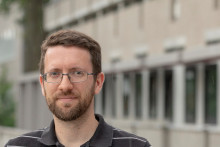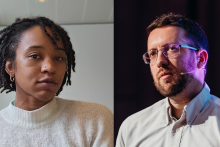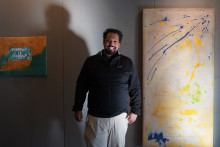Nolen gertz
Nolen Gertz is Assistant Professor of Applied Philosophy at the University of Twente and an author of several books. His latest book titled Nihilism is published by the MIT Press and will become available on the 10th of September, 2019.
Your book ‘Nihilism and Technology’ was only published last year. Why did you write yet another book on this topic?
‘I sent the manuscript of my previous book to MIT. They liked it but wanted a more accessible version of it, a shorter version that could go to any bookstore. So I took the ideas I didn’t use in the first book and moved from 80.000 words to 40.000 words. I was writing both books simultaneously and trying desperately not to repeat myself.’
Have you succeeded?
‘I think so. We just had the book launch at MIT last week and a lot of people came. The first reviews and reactions have been very positive.’

Nolen Gertz (on the right) at the official book launch in the US.
There is a whole book about it, but can you explain the concept of nihilism in a nutshell?
‘It literally means “nothing-ism”. Nihilism is a word you see often. Especially since Trump was elected, the word has been used a lot to describe the contemporary culture but nobody ever seems to bother to describe what it means. In the book I try to explain that there is a lot more to nihilism than just the “nothing matters, who cares” attitude and explain why it is destructive.’
You believe nihilism is destructive?
‘Yes. While most people compare nihilism to pessimism and apathy, it is actually closer to optimism and idealism. Pessimists believe that everything will turn out badly and because of that they tend to be more rooted in reality. Optimists, on the other hand, believe everything will be fine. Just like nihilists, they are not willing to face the real world. Optimists hang onto hopes and dreams – onto the future. They hang onto things that have not happened yet instead of dealing with what is now, because that would make them feel bad. If you think that everything will just turn out fine, you will not change things. You will not quit your job, you will not yell at your professor, you will not start a revolution. Nihilism is linked to escapism.’
Like escaping reality by watching Netflix? In your TED-talk, related to your books, you linked Netflix to nihilism. ‘Netflix and chill? More like Netflix and freeze to death,’ you said.
‘That’s right. When Netflix started it was all about offering a huge library of choices, so that the consumer could choose anything and watch for hours on end. From that, a “nihilism and chill” hashtag got started, meaning “don’t disturb me, I’m staying in tonight and I don’t care about anything”. Netflix picked up on that and came up with the whole “Netflix and chill”. It turned from offering options to saying: Look, we have an algorithm that will choose for you. This technology will choose for you, so you can be happy. You are liberated from having to choose!’
What are the dangers of that?
‘If you define being human as a struggle to make choices, then by allowing technology to make choices we become more inhumane and the technology more humane. We become robotic, while the technology becomes human. Does freedom mean being free to choose or does it mean to be free from choice?’
Why does the topic of nihilism appeal to you personally?
‘My first book The Philosophy of War and Exile was explicitly about suicide. I was looking at the number of soldiers who killed themselves and trying to understand why. So it was about nihilism in a way, because another word for nihilism could be suicide. There is something suicidal about the way we live our lives. We live by the motto “don’t worry, be happy”, but taking life for granted is not healthy. The idea of being worry free is seen as healthy, while worrying is seen as an unnecessary stress. But worrying relates to responsibility, to topics such as climate change and sustainability. I’m sure some politicians would be much happier if people such as Greta Thunberg [environmental activist, Ed.] would just reassure everyone that everything will be fine, instead of warning that the world could end soon.’
You didn’t really answer why nihilism appeals to you personally…
‘I just feel it. I’m a nihilist. I criticize technology that I use. I publish critical articles about Facebook, yet I still have a Facebook account. I publicly attack Netflix, yet I have a Netflix account. So my book is a self-help book in a sense.’
Are you planning to write more books in the near future?
‘That is what my publisher asked me as well. Last year I submitted an ERC proposal. I had an idea to look at the link between suicide, anxiety and depression and technology. I wanted to look at technology which was designed to help against depression because, being who I am, I think that these technologies are actually counterproductive. I didn’t get the grant, but I’m working on this idea, so it could possibly turn into a book.’







